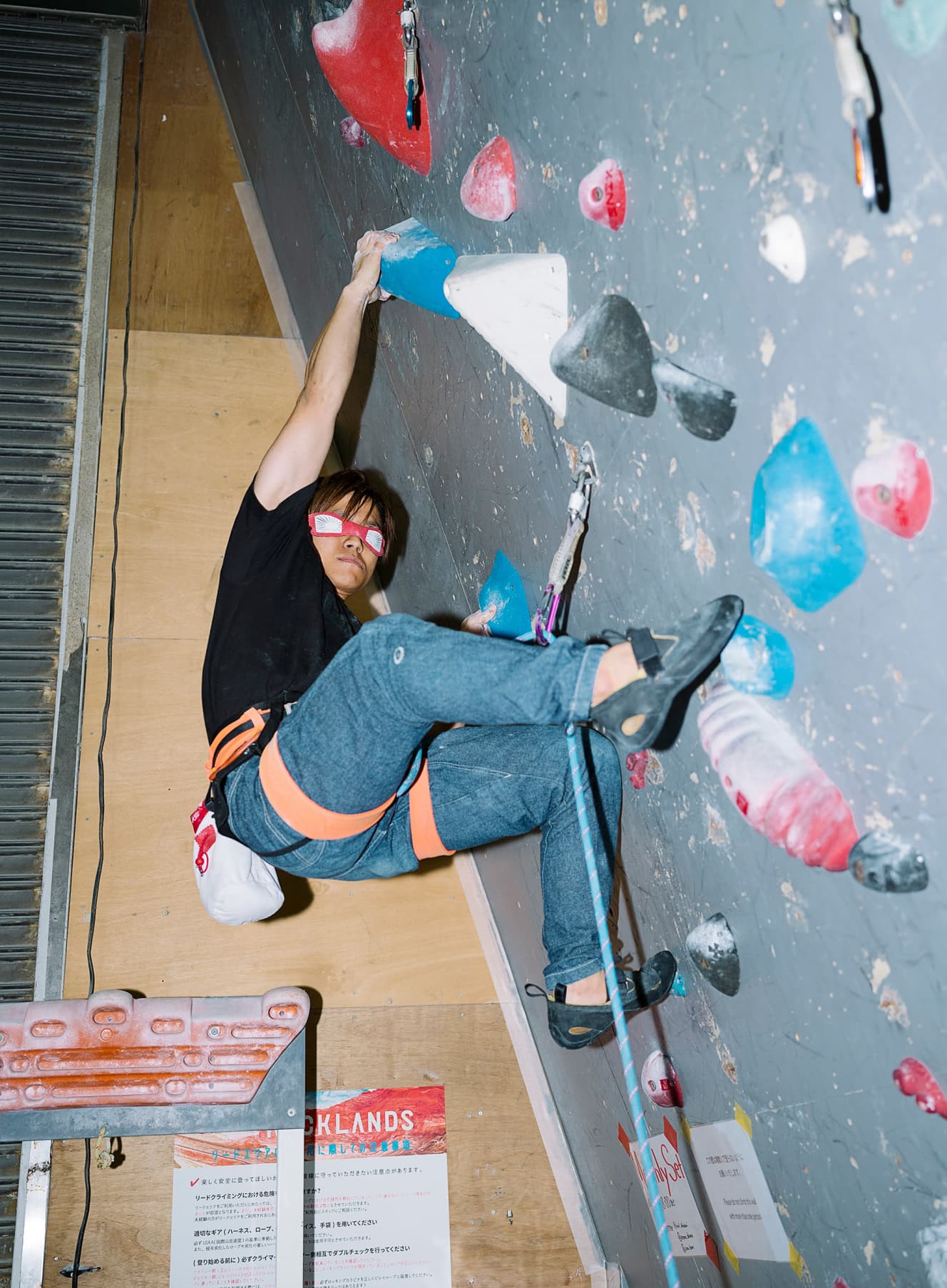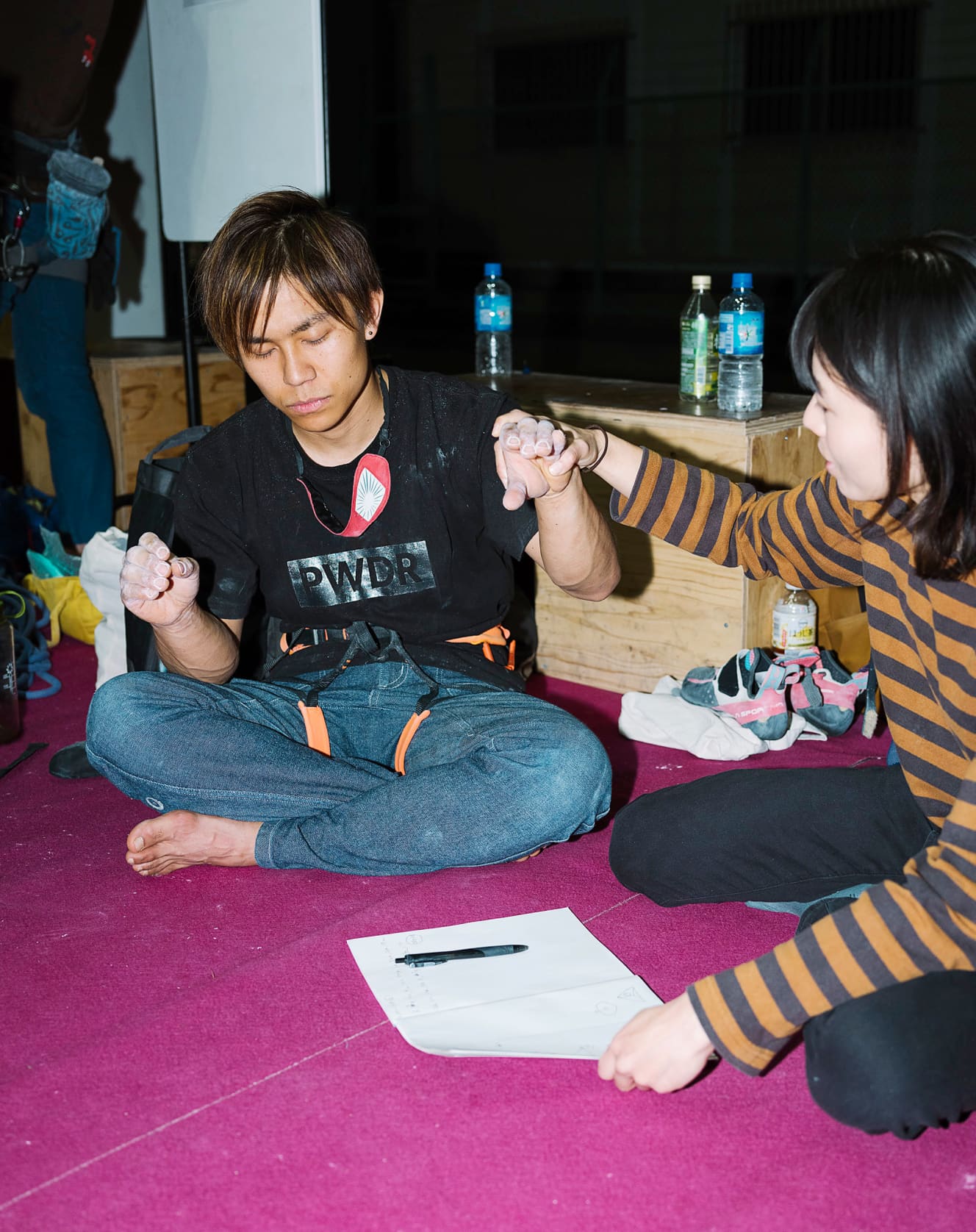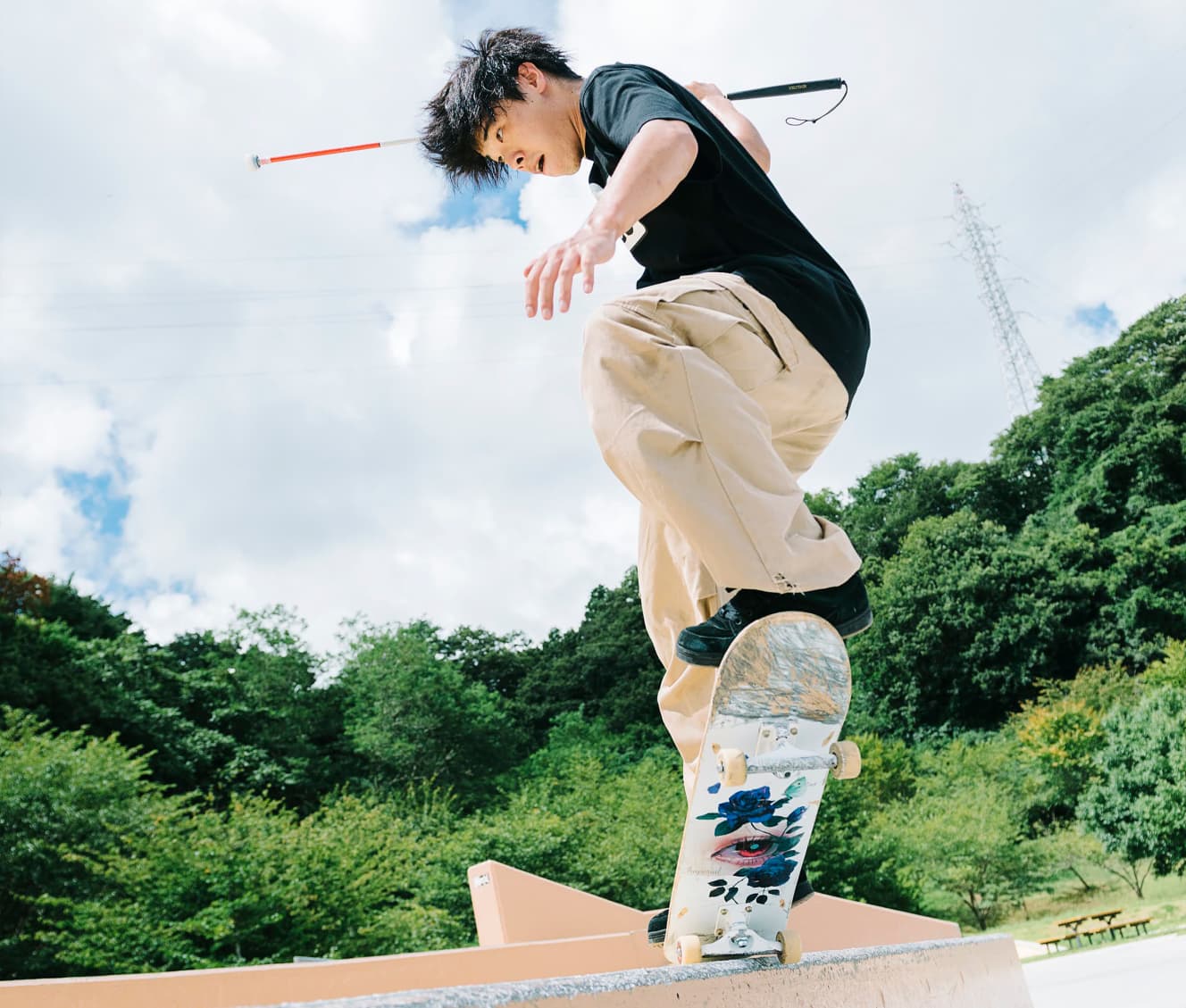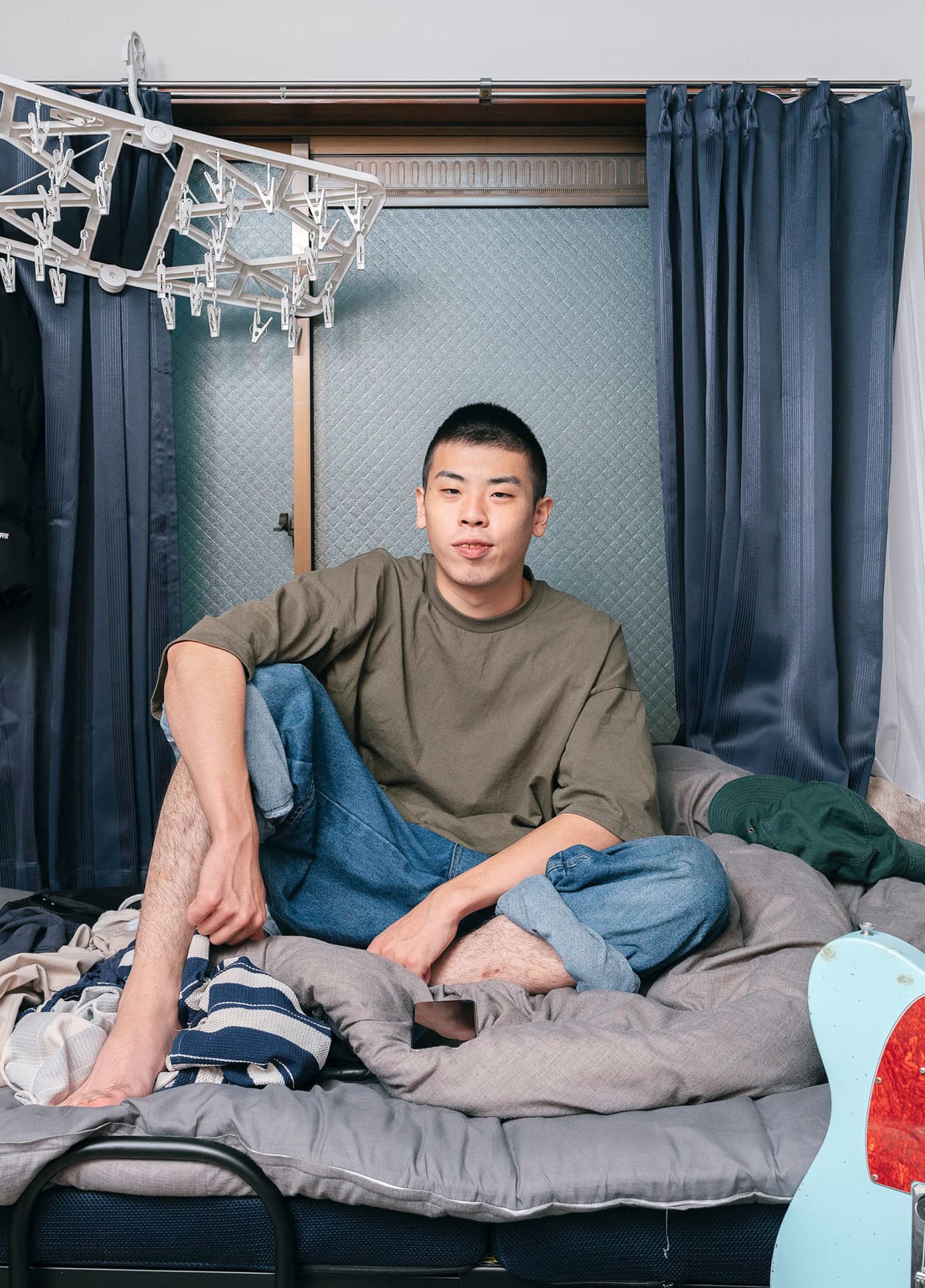Sports Nonfiction》How Visually Impaired Athletes Overcame the Fear of Not Being Able to See
Even though he has lost most of his vision, he is still working and competing against the world.

2 o’clock” “5 o’clock!” –. The blindfolded man held the hold in the indicated direction as if he could see, and climbed up the 10-meter-high wall to the voice of the leader standing at the bottom of the wall.
A Japanese athlete who has twice won the world’s top prize in the Paraclimbing World Championships, in which visually impaired athletes compete. He is Fumiya Hamanoue, 33, who showed us his “divine feat” in the previous section. His first encounter with the sport was an unexpected one.
I was actually motivated by pornography (laughs).” In 2004, I met the vice president of Monkey Magic, a nonprofit organization that promotes climbing for the physically challenged, at an event called “Adult Sexual Love Night,” which was sponsored by TENGA, a manufacturer of adult goods.
Hamanoue was diagnosed with retinitis pigmentosa, a progressive disease, when he was in his second year of junior high school.
I could see everything around me during the day, but at night it became difficult to see. I even hit a car from the side when I was riding my bicycle.
It was just before he took the university entrance exam that he was told by the doctor that he was classified as “Level 2 handicapped.
I remember being vaguely shocked by the term “disabled. Now, I have difficulty seeing even in daylight. To give you an idea of how much I can’t see, I can only vaguely make out a person in front of me even when we are talking face to face at close range.
During his job search, he applied to about 80 companies, but was not hired at any of them. He managed to find a job as a clerical worker at a general trading company group. About a year after joining the company, Hamanoue had a turning point when he was transferred from Osaka to the Tokyo headquarters.
I received a newsletter from a community for the visually impaired I was attending in the Kansai area.
It was an invitation to an “Otona no Irokoi Night. It was an event where radio DJs read sensual novels at a co-working space in Shibuya Ward.
At the party, the vice president of Monkey Magic invited me to come to a climbing event at his place. I went there and met Koichiro Kobayashi, the head of Monkey Magic and a former world champion in para-climbing.
Mr. Kobayashi took his World Championship gold medal out of his pocket and let me touch it. He was fascinated by the joy and happiness he saw in the people around him, and felt that he wanted to be like him.
Since then, he has spent almost every day climbing. In December of last year, he was hired as an athlete by a construction company. Even now, he spends his days immersed in practice.
This may come as a surprise, but he says he has no fear of not being able to see during competitions.
Compared to able-bodied people who know which hold to grab next, I have to wait for instructions before I can aim for the next hold. Because of the long waiting time, I have developed the ability to ‘stay on the wall’ more than anyone else, which is indispensable in this competition. In the future, I hope to compete in the Paralympics and win the championship. I want to challenge myself to see how much I can break the image many people have of the visually impaired.”


Using his white cane as a sensor, Ouchi checks the shape of the course and jumps onto the curb with his skateboard. Tatsunari Ouchi, 23, easily turned around and sped down the angled ramp. He is also a visually impaired para-athlete.
I’m extremely busy every day,” he said. I wake up at 6:30 a.m., feed my dog, get dressed, go to work at 9 a.m., come home at 6 p.m., go to skating practice, which takes 1.5 hours each way, and practice until 11 p.m.”
Ouchi, who is from Fukushima Prefecture, was diagnosed with an eye abnormality when she was in the first grade of elementary school. It was retinitis pigmentosa. When he started skateboarding in his third year of junior high school, he was still able to skate, but once he entered a special needs school, the disease progressed quickly. His vision was gradually taken away. Perhaps due to fear of not being able to see, he was unable to perform tricks he used to be able to do so easily, and he gave up on competitive skating for a while.
It was an encounter with a visually impaired skater that brought him back to skateboarding.
There is a skater in the U.S. named Dan Mancina, who is able to perform difficult tricks with a white cane. When I learned about him, I decided to give skateboarding another serious try. Still, at first I was worried about how I was going to make a living while I was losing my eyesight. I vaguely wanted to work in skating, but even if I did private coaching, if I couldn’t see, I wouldn’t have any credibility. But then I thought it would be good if I could become an acupuncturist, which even visually impaired people can do, and maintain skaters’ bodies while working.
He found that his fear of not being able to see had disappeared.
After graduating from a special needs school, he started dormitory life at a vocational training school in Saitama Prefecture.
While working toward his national certification as an acupuncturist and moxibustion therapist, he resumed practicing skateboarding. His skillful skateboarding with a white cane in one hand became a hot topic on social networking sites, and when he participated in an international competition in ’19, he was in the limelight of a large audience.
He also holds Guinness World Records for the number of consecutive blindfolded ollies (jumping with a board) and the number of ollies in one minute.
Ouchi graduated from a vocational training school this spring. He started his new life as an acupuncturist and skateboarder. In his personal life, he once had a crush on a female convenience store clerk.
There was a clerk with a nice voice, and I became friends with her and went on a date with her. We went to see a suspense movie together. I can’t see the screen, but I can enjoy it through sound. We even held hands on the way home.
We went to a shrine for matchmaking, and I said, ‘This means we’re dating, right?’ She said, ‘I like you too,’ and we decided to go out then. However, she told me she was 54 years old. I didn’t expect her to be older than her mother, so I was surprised.
We asked Mr. Ouchi, who smiles and says that every day is fulfilling, about his goals for the future.
In terms of work, I would like to practice sports acupuncture and moxibustion in the future. As for blind skating, I want to increase the number of skaters. So I want anyone who is even remotely interested in skateboarding to contact me on my Instagram.
Neither skateboarding nor climbing is recognized as an official sport at the Paralympics.
Still, there is no pathos for these two. Even though they have lost most of their vision, they are really friendly. Their positive attitude and lack of hesitation is what makes them divine. Their dazzling charm should be a driving force to enliven para-sports.

From the November 10 and 17, 2023 issues of FRIDAY
Interview and text by: Hironori Jinno (nonfiction writer) PHOTO: Hiroshi Ikeda